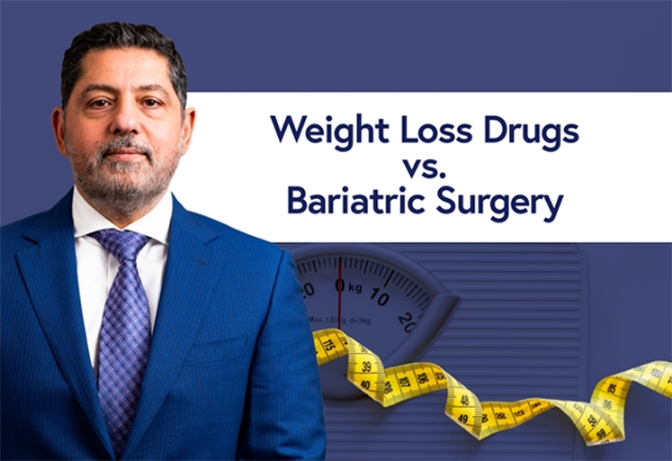Weight Loss Drugs vs. Bariatric Surgery – Which is Right For You?
If you’re trying to lose weight and finding it difficult, you may have considered taking medications or undergoing bariatric surgery. Both of these... read more
Call Us Today (732) 640-5316
E-Waiting RoomBarrett’s esophagus is a tricky condition to diagnose and treat, which is why you need to consult the best in the field at Advanced Surgical & Bariatrics of NJ, PA. Experience and training prepare these Barrett’s esophagus doctors to provide the most accurate diagnosis and the most effective treatment. They know what to look for and how your risk factors contribute to the possibility that you’ve developed the condition. Call for a consultation in northern New Jersey or eastern Pennsylvania.
Barrett’s esophagus is a condition where the tissue of the esophageal lining begins to resemble the small intestine — oval and bumpy. It usually occurs in people who’ve suffered from long-term gastroesophageal reflux disease (GERD), also referred to as acid reflux. While the majority of patients with Barrett’s esophagus won’t develop cancer, the tissue can degenerate into pre-cancerous cells called dysplasia. Fortunately, these pre-cancerous cells respond well to treatment, as long as they’re caught in time.
The longer you wait, the worse your condition is likely to become. So don’t hesitate to make your appointment for a consultation.
Despite extensive research, scientists have yet to pin down the exact cause of Barrett’s esophagus. Not everyone who suffers from long-term GERD develops the condition. Some people who get Barrett’s esophagus have never suffered from heartburn or acid reflux.
The preponderance of evidence suggests that stomach acid causes long-term damage to the esophageal lining. When your body tries to heal itself, a cellular change takes place. The result is the abnormal esophageal condition.
While Barrett’s esophagus can occur in anyone, certain factors make you more susceptible to the disease. Some of the most prominent include:
The tissue change associated with Barrett’s esophagus won’t cause any noticeable symptoms by itself. It’s the GERD symptoms you and your doctor need to watch, which include:
Seek immediate attention if you experience:
In some cases, you can have Barrett’s esophagus and not experience any symptoms. If you have any of the risk factors or you’ve suffered from GERD for more than five years, ask your doctor if you’re at risk of developing Barrett’s esophagus. The experts at Advanced Surgical & Bariatrics of NJ, PA determine quickly if you’ve developed any signs of the condition.
Advanced surgical & bariatrics, is such an amazing group. The friendliness and professionalism of the staff are amazing, if I could rate it beyond 5 stars I will in a heart beat. All the Dr's in office are amazing and thoroughly explain everything in deep detail. Dr. Donaire is amazing and is currently the surgeon taking care of my case. Overall I recommend this office to everyone. Staff is impeccable from the moment you walk in the door, and you can call that office 10x a day and the patience and calmness of the staff is amazing. Love them.
Deyanira M.Barrett’s esophagus doctors use a long flexible tube with a light and camera on it called an endoscope to examine your esophagus. During the endoscopy, your doctor removes a tissue sample for testing and submits it to a pathologist for confirmation.
The pathologist studies your sample to determine whether or not your sample contains dysplasia. If there’s no dysplasia present, your doctor can focus on treating your GERD and perform periodic endoscopies. If the results are positive, the next question is to what extent. Advanced cases may be closer to turning cancerous.
If the sample shows low-grade dysplasia, your doctor may perform an endoscopic resection. In this procedure, damaged cells are removed with an endoscope. Your Barrett’s esophagus specialist may also try radiofrequency ablation, which uses heat to remove the damaged cells. This procedure can be performed on its own or following an endoscopic resection.
High-grade dysplasia can lead to esophageal cancer. If your dysplasia is advanced or the previous treatments were unsuccessful, your doctor may recommend:
While no foolproof Barrett’s esophagus cure yet exists, state-of-the-art treatments have proven safe and effective. The doctors at ASBNJ work on acid reflux issues extensively. They’re poised to provide the best treatment for Barrett’s esophagus.
If you’ve been suffering from GERD symptoms for an extended period, it’s time to consult a specialist. The medical team at Advanced Surgical & Bariatrics of NJ, PA, is committed to continuing your education of the condition while keeping abreast of the latest treatment techniques. Don’t wait; contact ASBNJ today.

Dr. Ragui Sadek is a premier surgeon who established a state-of-the-art and one of the safest bariatric surgery programs in the state. Dr. Sadek has fellowship training in both laparoscopic/bariatric surgery and surgical trauma/critical care, allowing him to safely perform complex surgeries on patients who have been turned down by other practices. As a Clinical Assistant Professor of surgery at RWJ Medical School & the Director of bariatric surgery program at RWJ University Hospital, Dr. Sadek offers a cutting-edge range of laparoscopic, robotic, & bariatric surgical procedures with a complication rate substantially below the national average.
Dr. Sadek is a Clinical Assistant Professor of Surgery at Rutgers-Robert Wood Johnson Medical School and a Fellow of the American College of Surgeons. Having performed more than three thousand advanced surgical procedures, Dr. Sadek has established a strong patient satisfaction rate and a solid reputation among the surgical community and is renowned as a top physician in his field by International Association of Healthcare Professionals. As a board-certified surgeon, he holds affiliations with the American Society of Metabolic and Bariatric Surgery and the Society of American Gastro Endoscopic Surgeons. More about Dr. Sadek
Stay current with Advanced Surgical & Bariatrics of New Jersey

If you’re trying to lose weight and finding it difficult, you may have considered taking medications or undergoing bariatric surgery. Both of these... read more

Are you frustrated with your inability to lose weight? Tired of being trapped in an endless cycle of yo-yo dieting, over-exercising, cleanses, and... read more